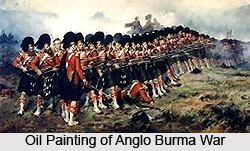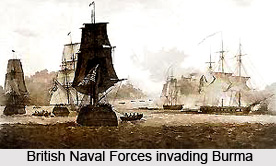 First Anglo-Burmese War was the first colonial war against the kingdom of Burma and the north eastern part of India. Occurred on March 5, 1824, Anglo-Burmese War was the first war among the three wars. Happened in early phase of 19th Century, Anglo-Burmese War began primarily over the control of north-eastern India, ended in a decisive British victory, giving the British total control of Assam, Manipur, Cachar and Jaintia (now Jaintia Hills District, located in Meghalaya) as well as Arakan Province and Tenasserim.
First Anglo-Burmese War was the first colonial war against the kingdom of Burma and the north eastern part of India. Occurred on March 5, 1824, Anglo-Burmese War was the first war among the three wars. Happened in early phase of 19th Century, Anglo-Burmese War began primarily over the control of north-eastern India, ended in a decisive British victory, giving the British total control of Assam, Manipur, Cachar and Jaintia (now Jaintia Hills District, located in Meghalaya) as well as Arakan Province and Tenasserim.
First Anglo-Burmese War was the longest and most expensive war in the history of British India on colonialism. For the Burmese, and the people of north eastern part of India, it was the beginning of the end of their independence. The Third Burmese Empire, for a brief moment the terror of British India, was crippled and no longer a threat to the eastern frontier of British East India Company.
The Burmese conquests of Manipur and Assam had created a long border between British India and the Burmese Empire. The British, based in Fort William (Kolkata), had their own designs on the region, and actively supported rebellions in Manipur, Assam and Arakan. Kolkata unilaterally declared Cachar and Jaintia British protectorates, and sent in troops. The cross border raids into these newly acquired territories from British territories and spheres of influence vexed the Burmese.
 From the year May 1824 to November 1825, there happened a fierce battle between the Burmese empire and British Empire based in Kolkata. This battle was popularly known as Battle of Yangon
From the year May 1824 to November 1825, there happened a fierce battle between the Burmese empire and British Empire based in Kolkata. This battle was popularly known as Battle of Yangon
The defeat in Prome (now in Myanmar) effectively left the Burmese army in disarray. The Burmese army was in constant retreat from then on. By February 1826, the Burmese were forced to accept the British terms to end the war. On 26 December, they sent a flag of truce to the British camp. Negotiations having commenced, peace was proposed to them in the Treaty of Yandabo.
Treaty of Yandabo was the peace treaty that ended the First Anglo-Burmese War. The treaty was signed on 24 February 1826 by General Sir Archibald Campbell on the British side, and by Governor of Legaing Maha Min Hla Kyaw Htin from the Burmese side. With the British army at Yandabo village, only 80 km from the capital Ava, the Burmese were forced to accept the British terms without discussion.
According to the treaty, the Burmese agreed to cede to the British Assam, Manipur, Rakhine (Arakan), and Taninthayi (Tenasserim) coast south of Salween River, and cease all interference in Cachar and Jaintia. After that the empire of Burma had to pay an indemnity of one million pounds sterling in four instalments. There was an allowance for an exchange of diplomatic representatives between Ava and Kolkata, and to sign a commercial treaty in due course.



















